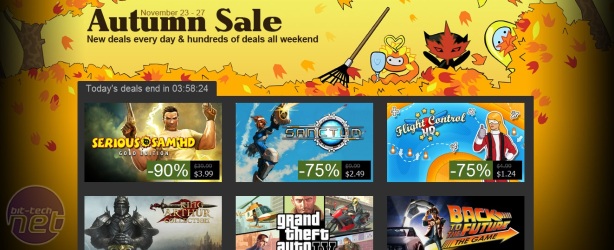Steam Sales and Devaluation
If you're anything like, oh, all of my friends then you'll have spent nearly all of last week in a state of constant, twitchy excitement. It was the Steam Summer Sale! There were ludicrous discounts all around! Oh, frabjous day!Some of you may have even saved money specifically in anticipation for the occasion, planning to buy enough games now to last you until the Steam Christmas sale. The frabjousness never ends!
Or does it? Is it possible the constant stream of discounts on Steam, of which these yearly mega-sales are just the tip of the iceberg, be damaging for the industry as a whole? I can't pretend to have the answer, but the notion is worth considering for a number of reasons.
The main and most obvious reason for why these kind of huge sale events may be a bad idea is that they, as EA has intimated, may end up devaluing the products on sale. If there are constant sales on offer and buying games becomes entrenched in a discount mindset, the lessened price becomes the norm - Arkham City goes from being worth £30 to being worth £15. Then, just as Batman found out, escalation can become a problem.
At first glance this can seem like a good thing for gamers; more cheap games. The trouble however is that, if games are too much cheaper then publishers face increased risk and reduced profit - and so become even less inclined to innovate, assuming they can survive. Independent developers who create generally cheaper games could be affected by this race-to-the-bottom too, don't think otherwise.
There are two natural and immediately obvious complaints against this idea of devaluation. Firstly, that those who buy games at a discount are unlikely to have bought them at full price - and that it's better for Arkham City, for example, to get £15 than nothing. Secondly, that the sheer volume of games being sold during big discount events makes them worthwhile for the developers involved. Dear Esther's Rob Briscoe revealed that that game sold 118k copies in just one 48 hour Steam sale - more than it had sold previously since launch. That's a lot of money made for a very worthwhile product.
(You might also say that Steam isn't the only digital distributor doing sales like this. You're right. They are the biggest though and therefore make comfortable shorthand.)
Given the number of high profile successes that have arisen from these sort of sales, as well as Valve's well-reasoned explanation about why it runs them, it's hard to dispute these points. But then, if you believe games are being devalued by these sales then you don't have to address these issues wholly - the number of people buying discounted games could be taken in part as proof of that devaluing process.
As I said at the start, I know many people who've got into a pattern of only buying games during the Steam Summer and Christmas sales. They just buy enough titles then to last another six months and, while that does mean a lot of games are sold, it does also mean less money in the industry as a total. These are serious gamers, after all, who would've bought games throughout the year at full price in another situation.
As I also said at the start, I can't pretend to have the answer to this question - I simply don't have the data or the expertise in retail economics to interpret it. The only people who might are the distributors like Steam, all of whom play their cards suspiciously close to their chests.
All I can really say is that, even if I had all the numbers, I wouldn't be convinced they'd tell the whole story. How many people do or do not buy a game is only one signifier of an issue that I think is more to do with customer entitlement. It's not a question of how many people are buying games, but whether we think games are worth less now than they were five or six years ago - which is why I look forward to reading your comments.

MSI MPG Velox 100R Chassis Review
October 14 2021 | 15:04












Want to comment? Please log in.